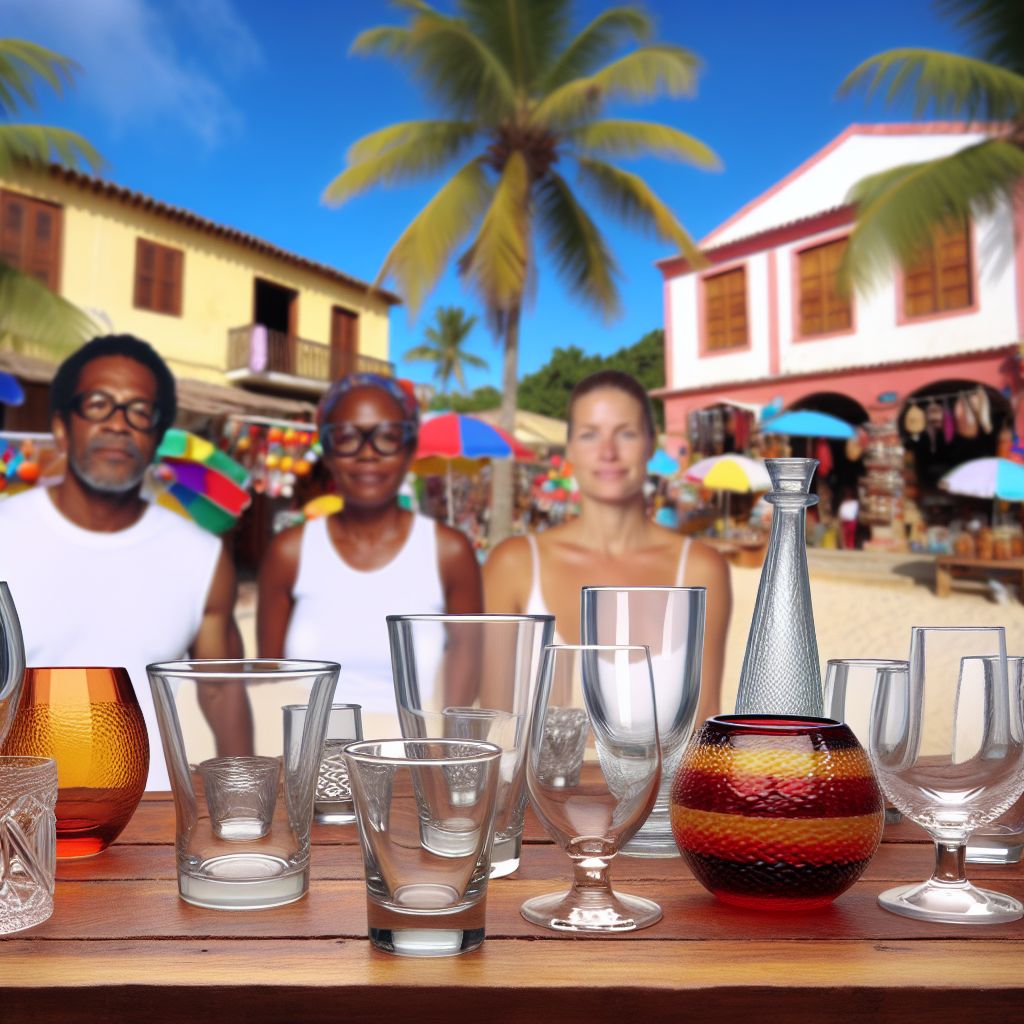Deutsch: Glaswaren / Español: Cristalería / Português: Vidraria / Français: Verrerie / Italiano: Vetreria
Glassware in the context of travel refers to a variety of glass products that travelers might encounter, purchase, or use during their journeys. These items range from decorative pieces and souvenirs to practical items used in accommodations and dining establishments. Glassware can also be a significant part of cultural heritage and craftsmanship in various destinations.
Description

Glassware encompasses a wide range of glass products, including drinkware, decorative items, and functional glass pieces. In the context of travel, glassware often highlights local craftsmanship and artistic traditions. Tourists may encounter glassware in shops, markets, and cultural exhibits, often reflecting the unique styles and techniques of the region. Common examples of glassware include wine glasses, vases, bowls, ornaments, and artisanal pieces created by local glassblowers.
Special Aspects
Several unique aspects make glassware a significant part of the travel experience:
- Cultural Representation: Glassware often reflects the artistic and cultural heritage of a destination. For example, Murano glass from Venice is renowned worldwide for its craftsmanship and beauty.
- Souvenirs and Gifts: Travelers frequently purchase glassware as souvenirs or gifts, capturing the essence of their trip and supporting local artisans.
- Local Craftsmanship: Many regions have distinctive glassmaking techniques and styles, providing travelers with unique and authentic items.
- Functional Use: High-quality glassware is often found in hotels and restaurants, enhancing the dining experience and showcasing local hospitality standards.
Application Areas
- Shopping and Souvenirs: Glassware is a popular choice for souvenirs, with travelers seeking unique and locally-made items to take home.
- Cultural Tours: Many travel destinations offer tours of glass factories and workshops, where visitors can watch artisans at work and learn about the glassmaking process.
- Accommodation and Dining: Hotels and restaurants often use elegant glassware to create a refined dining experience, reflecting the local culture and quality standards.
- Museums and Exhibits: Glassware is commonly displayed in museums and cultural exhibits, highlighting historical and artistic significance.
Well-Known Examples
- Murano Glass (Italy): Murano, an island near Venice, is famous for its high-quality, handcrafted glass products, including chandeliers, vases, and sculptures.
- Waterford Crystal (Ireland): Renowned for its exquisite crystal glassware, Waterford produces a range of items from glasses to decorative pieces.
- Bohemian Glass (Czech Republic): Known for its colorful and intricate designs, Bohemian glass is a symbol of Czech craftsmanship and artistry.
- Fenton Glass (USA): Based in West Virginia, Fenton is famous for its handcrafted art glass, including unique vases and collectible items.
Treatment and Risks
While glassware can enhance the travel experience, it also comes with certain considerations:
- Fragility: Glassware is delicate and can easily break during travel, requiring careful packing and handling.
- Transport Regulations: Travelers must be aware of airline and customs regulations regarding the transport of glassware, especially when it comes to size, weight, and import restrictions.
- Authenticity: Ensuring the authenticity of purchased glassware can be challenging, as some markets may sell imitations. It's important to buy from reputable sources.
- Value and Insurance: High-value glassware should be insured during travel to cover potential loss or damage.
Similar Terms
- Crystalware: A type of glassware made from lead crystal, known for its clarity and brilliance.
- Art Glass: Artistic glass pieces that are often handcrafted and unique, used for decorative purposes.
- Stemware: A type of glassware with a stem, such as wine glasses and champagne flutes.
Weblinks
- industrie-lexikon.de: 'Glaswaren' in the industrie-lexikon.de (German)
Summary
Glassware in the travel context refers to various glass products that travelers may encounter, use, or purchase during their journeys. It reflects local craftsmanship and cultural heritage, making it a popular choice for souvenirs and gifts. From the renowned Murano glass in Italy to the exquisite Waterford crystal in Ireland, glassware enhances the travel experience by offering unique, functional, and decorative items that capture the essence of a destination. However, travelers must consider the fragility and transport regulations associated with glassware to ensure its safe journey home.
--
Related Articles to the term 'Glassware' | |
| 'Gastronomy' | ■■■■■■■■■■ |
| Gastronomy in the context of travel refers to the Exploration and enjoyment of a destination’s Food, . . . Read More | |
| 'Shopping' | ■■■■■■■■■ |
| Shopping in the context of travel refers to the experience of purchasing goods, souvenirs, and unique . . . Read More | |
| 'Tableware' at top500.de | ■■■■■■■ |
| Tableware: In the industrial or Industry context, tableware refers to the items used for setting a Table, . . . Read More | |
| 'African' | ■■■■■■■ |
| African in the context of travel refers to anything associated with the Continent of Africa, including . . . Read More | |
| 'Civilization' | ■■■■■■■ |
| Civilization: A civilization (US) or civilisation (UK) is any complex society characterized by urban . . . Read More | |
| 'Culture' at fashion-glossary.com | ■■■■■■■ |
| Culture: In the fashion context, culture refers to the influences, traditions, and values of a particular . . . Read More | |
| 'America' | ■■■■■■■ |
| In the travel context, America refers to a vast and diverse continent that is often divided into three . . . Read More | |
| 'Highlight' | ■■■■■■■ |
| In the travel context, highlight refers to an Attraction, experience, or aspect of a destination that . . . Read More | |
| 'Moisture' | ■■■■■■■ |
| Moisture in the travel context refers to the presence of Water or humidity in the environment, which . . . Read More | |
| 'Magazine' | ■■■■■■■ |
| Magazine in the travel context refers to publications that provide information, inspiration, and tips . . . Read More | |
